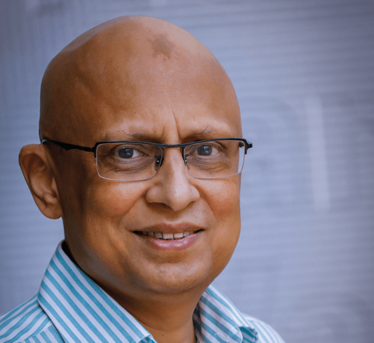Champion of Generics
Sitting Down With... Abhijit Mukherjee, Chief Operating Officer at Dr. Reddy’s Laboratories, India.

How did your career begin?
When I graduated from Engineering School in India during the 1980s, I didn’t have a specific career plan, but my family were keen for me to get working. At the time, the job market was dominated by a few large multinational companies – the main choices were either ICI or Unilever. I joined the latter as a management trainee in a very technical job (working with aroma chemicals and detergents), but it gave me the opportunity to work in different countries. Unilever did not encourage superficial learning, but rather the importance of going into the details. It was an important phase of my career – the early days are always a key learning experience. And working hard back then was always very much appreciated (not always the case today).
How did you transition to a business role?
I’d always had a liking for numbers – even on the shop floor I would attempt to connect any activity I was doing to a financial return. However, jumping from a technical role to a business role in the 1990s was not easy. Nevertheless, after around 13 years with Unilever, an opportunity presented itself at a large, chemical conglomerate in India, where I was involved with the business end-to-end – from manufacturing, to sales, to dealing with banks and the collection of money. I ended up heading their bulk chemical and intermediates business, before Dr. Reddy’s made me an offer in 2003 to join their management council as the Head of Custom Pharma business.
What was Dr. Reddy’s like when you joined?
At the time, the business I took charge in Dr. Reddy’s was an incubating business. Turnover was zero, but aspirations were high. I was interested in the challenge and destiny was kind. The business grew fast organically and with some quick acquisitions (in the UK and Mexico). I was also given additional charge of the API business, which I ran for a while. I then moved into the core business, eventually becoming the Chief Operating Officer around three years ago.
What are your main challenges in your current role?
The main challenges I face in my position are those which the whole generics industry faces. One major headwind is the huge number of mergers and acquisitions among pharmacy managers and retail chains in the US, which has boosted their bargaining power and created pricing pressures for generics manufacturers. The consolidation of channels has been a significant challenge for us, especially considering that over 50 percent of our business is in the US.
Another major challenge has been the increasing expectations from regulators – both in the US and elsewhere. Exports from India have rapidly increased in recent years and regulators have stepped up for valid reason to ensure high standards. I think the entire industry – ourselves included – has somewhat struggled to keep pace, but valuable lessons have been learned along the way.
Finally, macroeconomic turmoil in emerging markets has hit commodities hard. We have a fairly big presence in Russia, whose currency took a major hit in recent years, as well as Ukraine, where the situation has been even worse. But the good news is that those economies have stabilized more recently and, after such a dip, you tend to see a solid four or five years of growth ahead. I’m optimistic about emerging markets, particularly as we’ve restructured and opened some new business avenues there. We’ve set ourselves in good stead to capitalize on the current period of stability.
What makes you the most proud about your work?
Dr. Reddy’s spends in the region of 12 to 14 percent of our turnover on research and development. What really makes me proud is when those passionate efforts generate societal benefits – especially in terms of access to medicines in underserved markets. One specific example we are currently working on is the creation of institutional businesses for oncology products in emerging markets. Prices are high and access to oncology drugs is shockingly low in emerging markets – not because the prevalence of the disease is much lower than in the developing world, but because of issues around government funding. We are currently playing a significant role in delivering oncology medicines to patients in various countries across South America, Eastern Europe and Asia.
If you could change one thing about the pharma industry, what would it be?
Changing the perception of the generics industry would be at the top of my wish list. I truly believe the generics industry is creating a great deal of value in terms of accessible and affordable medicines, both in developed countries and emerging markets. But the access to generic is a constant barrier, especially in emerging markets It’s an unspoken tragedy. By changing perceptions and the image of the industry, we might tip the balance in future, leaning in favor of generics industry – which I think would be of benefit to patients.
The generics industry seems to go through highs and lows, and I think it’s currently going through a bit of a low, but I keep telling people that now is the time to be resilient and to have confidence in your values. If we do that, I believe the next decade will be a more successful one.
Abhijit Mukherjee is the Chief Operating Officer of Dr. Reddy’s Laboratories, India.



















